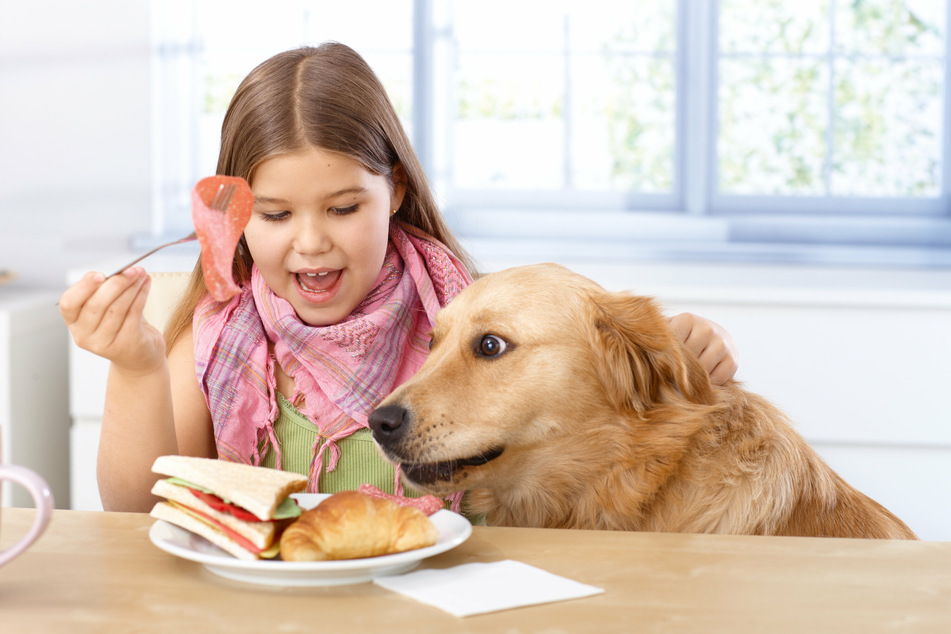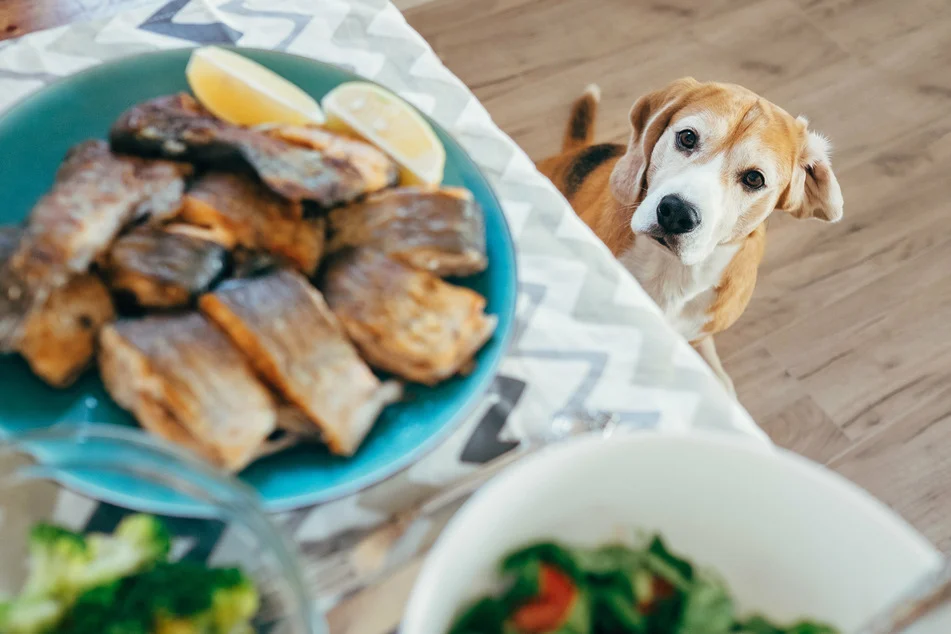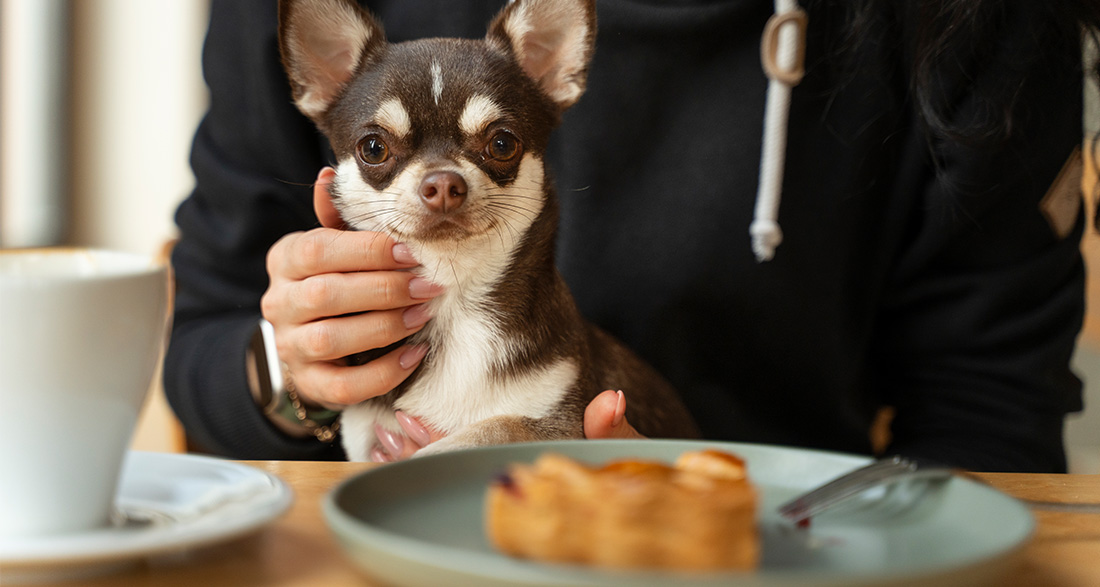Some dog owners may be familiar with it: You want to eat in peace, but your beloved four-legged friend begs all the time, and suddenly the sausage is missing from the plate. It’s not really pleasant, and it can even be dangerous when dogs steal food from the table or elsewhere.
Cheeky dogs that creatively swipe food from the table may seem cute at first, but most of the time, theft is not an exception, and stealing food quickly becomes an annoying habit for the four-legged companion.
Constantly stealing food not only strains the relationship between the dog and the human but can also be harmful to the dog’s health. Chocolate, nuts, grapes, and other foods are toxic to dogs. Additionally, the extra snacks could lead to overweight dogs.
Out of love for the dog, one should never share their food with the animal and should clearly discourage unwanted behavior in the kitchen or at the table. In this regard, it is essential to understand that consistent intervention towards the dog is not unloving but necessary to prevent disobedience and health issues.
The tips from the dog guide help you understand your dog’s behavior and prevent food stealing in the future.
Why does your dog steal food?

In most cases, dogs steal food or finished meals not because they are hungry. These behavioral abnormalities usually have other causes.
If the dog steals food in the presence of the owners, it can have the following reasons:
- The dog wants attention.
- The dog is accustomed to getting food from the table.
- Due to insufficient training, the dog does not recognize, for example, the dining table or the kitchen counter as boundaries.
- The dog lacks respect for the owner.
If the dog steals food when alone, the behavior can usually be attributed to the following:
- The dog is bored because it is physically and mentally under-stimulated. Stealing food challenges the dog on all levels, and it develops creative ideas to achieve its goal. This can go so far that the dog doesn’t even stop at closed cabinets.
- If the dog suffers from a nutrient deficiency, it may eat anything it can find. In this case, it eventually doesn’t matter whether it is alone or not. If this behavior persists for an extended period, one should check the quality of the dog food and may seek advice from a veterinarian.
When the dog steals food, owners should definitely discourage this behavior. Otherwise, their dog will soon disregard all guidelines and only do what it wants.
What helps when the dog steals food?
The crucial point is that stealing food must become an unrewarding and unnecessary behavior for the dog.
If the dog is healthy and is fed a balanced diet, it tries to impose its will on the owners, get attention, or simply does not understand the prohibition.
The following tips against stealing food can help with such dogs:
- Never feed the dog from the table or the kitchen counter. Also, offer dog food and snacks only in the bowl at the designated feeding area. This rule should be followed by everyone in the family, friends, and visitors.
- Consistently ignore the dog during meals, including avoiding eye contact.
- If the dog begs at the table or comes too close to those present, the animal should be consistently and clearly sent away. One can also lead the dog to its resting place with a house leash, give the command “Place,” and initially tie it there.
- Owners can train the dog to stay on its resting place during meals, which is preferably a bit away from the table.
- Never leave food unattended or accessible to the dog.
- If dogs are too food-focused, it can help to feed them only on a signal in the presence of the owners.

Behavior training for dogs
Dogs understand the connection between their actions and the consequent result only if the owners’ reaction occurs promptly or within three seconds.
Otherwise, they draw the wrong conclusions, for example, if they flee with the stolen food to their resting place, eat it there, and the consequence only follows later. In this case, the dog will still steal food but consume it in a different location next time.
If the dog steals food when alone, it is advisable to catch it in the act. A simple training method would be:
- Place food on the table and other locations.
- Leave the room but go to a place from which you can observe the dog.
- As soon as the dog goes for the food, correct the behavior with a clear command or signal. If the dog responds correctly to the interruption, this behavior should be reinforced with a reward.
For long-term behavior change, owners should conduct short training sessions with the dog every day.
Daily exercises, lasting about five minutes, often suffice to wean the dog from stealing food in the long run.
Training shows the dog that it is not allowed to steal food, but it does not solve the problem of boredom. Especially when dogs become more creative to steal food, it indicates a lack of stimulation.
Dog owners are encouraged to challenge their dogs more, for example, with active games outdoors. Tricky feeding toys or similar items also engage the dog. Subsequent breaks, such as in a resting position on the resting place before feeding, make the dog more balanced and ensure that feeding does not become a stressful situation for the animal.
Weaning the dog from stealing food requires as much patience, consistency, and calmness as general dog training.


